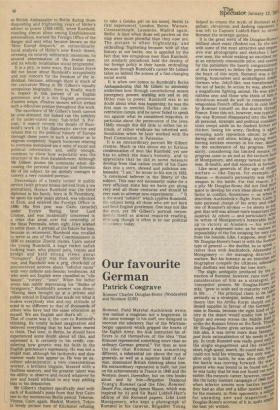Our favourite German
Patrick Cosgrave
Rommel Charles Douglas-Home (Weidenfeld and Nicolson £2.95) Rommel, Field Marshal Auchinleck wrote, was neither a magician nor a bogeyman. In the same message to his staff, one designed to exorcise the adulatory fear of the WUrttemberger opponent which gripped the hearts of the Eighth Army, the Auk instructed his officers to rid themselves of the idea "that Rommel represented something more than an ordinary German general." Yet then as now the idea that Rommel was something different, a substantial cut above the run of generals, as well as a superior kind of German, dominated British thinking about him. His extraordinary reputation is built, not just on his achievements in France in 1940 and the Western desert thereafter, but on two books about and by him—Brigadier Desmond Young's Rommel (and the film, Rommel: Desert Fox, starring James Mason, which was inspired by it) and Sir Basil Liddell-Hart's edition of the Rommel papers. Like Lord Montgomery, who kept a photograph of Rommel in his caravan, Brigadier Young
helped to create the myth of Rommel as ! gallant, chivalrous, and dashing opponent: It was left to Captain Liddell-Hart to invent Rommel the strategic genius.
It is the great merit of Mr Douglas-Home's brilliant short essay (fleshed out, by the NOY' with some of the most attractive and impres• sive war photographs and sketches I have ever seen, the whole making an excellent buY at an extremely reasonable price, and earning for the publishers the hearty congratulations of this reviewer) to define the personality 8,t the heart of this myth. Rommel was a dub. boring, humourless and unintelligent mide German who, Jekyll-like, was transformed 01, the act of battle. In action he was, above 811' a magnificent fighting animal. He was also a ruthless one; and those who think of him es chivalrous would do well to remember di! weaponless French officer shot in cold blNe by Rommel himself on the march throat; France. Even this act, however, was typical° the way Rommel disappeared into the battle. all personal, strategic and political considers; tions swept aside as he dashed hither afl. thither, losing his army, finding it agate,: sweeping aside opposition almost by shee' daring and will alone, killing, laying was,teetj leaving stricken enemies in his rear, dazzi by the exuberance of his progress. Nets sarily, considering his limited means, Wed progress came to an end at the taciturn ha°, of Montgomery, and energy turned to bide'. ness, ill-health, and dull reproach at fortune.L Like most generals of the age of moll warfare — like Dayan, for example, a% Sharon — Rommel's personality was itself,5 weapon in the battle. For this reason, it,le a pity Mr Douglas-Home did not find 111°`0 space to develop his own ideas about will aSue factor in conflict. Sometimes — as when describes Auchinleck's flight from Cairo t„ take personal charge of his army and rebin! one of Rommel's strokes — he seems to stigo gest that will was almost more important thap materiel. At others — and particularly v0.1,ed, he writes of Montgomery's inexorable bun „ up to victory at Alamein — his writinS, acquires a depressed note, as he realises tb; I impossibility of the fox escaping for very from the hounds. Like, I suppose, most of 11..si Mr Douglas-Home's heart is with the Rointne type of general — the duellist, so to sPenk r rather than with Auchinleck, Alexander °J Montgomery — the managing directors wo warfare. But his honesty as an historian "no biographer compels the ultimate admissi° that duellists win battles but lose wars. t, The slight ambiguity produced by the. ,0 traction of Rommel, however, runs over lan'i51 consideration of him as a strategist. P4. 'conceptive' powers, Mr Douglas-Home ,:te mits, "grew in scale and in maturity verY in life. . . ." His principal claim to be talc ,5 seriously as a strategist, indeed, rests on bbie theory that his Afrika Korps should tint denied supplies in favour of the German mies in Russia, because the right kind a vbe tory in the desert would enable him tote1:0 Egypt and sweep across the Middle East `t, strike the Russian forces on the flank. Thc)tigto Mr Douglas-Home gives serious attention a this idea, it was never more than fantasY,' post facto rationalisation of his needs in smrat ply. In truth Rommel was really good °PLY ,,, the single engagement and the relativeril7e short, high speed, march. He could win, b_ut could not hold his winnings. Not only no alive only in battle, he was alive onlY W„, a the battle was moving forward. He vic–tio general who was bound to be found out, no I
he was lucky that he was not found out earlier. His meteoric career, however, reirrielf,
like the lucky German campaign of 1940 °use when inferior armies won battles they had an elan and a killer instinct derneect for the moment, to their opponents, a subJAAr for unending awe and inspection• Douglas-Home's account of it is, quite stniP the best yet written.


































 Previous page
Previous page